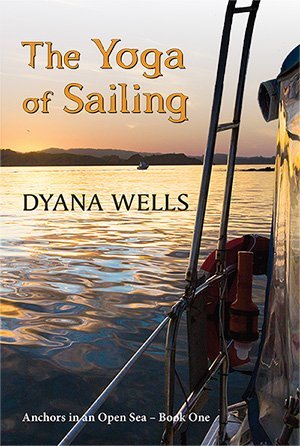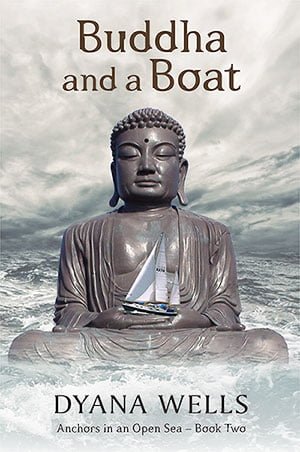CLIMBING PIRONGIA WITH ARIA AND SCARLETT
Late January I set out with two of my grandchildren – Aria and Scarlett, aged eight and seven – on a ten day camper van trip. We had been away for a couple of nights earlier just to see how it was, the three of us, sharing this small space together. Was it the sitting up so high on the bench seat gazing out over wide-ranging farm land and bush that entranced them, and me? The engine throbbed under the front seat, the flattened steering wheel turned like a bus, majestically, as our home wobbled along behind us? I relived the excitement of being young, which wasn’t hard because some well known part of me is still a child.
We return again to Kaniwhaniwha. The attraction is the river, the lanky rimu, sporting an acro-aquatics rope, for plunging through the air into water, under a hot sun, all elements blending seductively together. We will climb Pirongia, under whose shadow we now shelter, in a couple of days.
In the past I would go on meditation retreats to paralyse my limited views and scrub clean my senses. Bodywork dissolved the resistances in my body, the chronic tension of difficult stories warding off a threatening world. Meditation allowed the possibility of a radically new understanding. All I needed was a quiet focus to settle my mind so it could sink under the surface to discover something quite different.
Hanging out in nature is the way I do this work now. While the children play their games in the van, I sit under a tree, reading my spiritual texts very slowly, contemplating the meaning and scrutinising my experience. I let myself be unpacked, until there is nothing but mystery all around. The utter, ungraspable luminous presence of pure experience. The world we are born into, light-filled, timeless, spacious and powerful. We all started out bathed in this radiance. Meditation returns me to this place, to remind me, and then, when the girls call, I condense back into my small self so I can get on with looking after them. Being remade as solid now seems the wonder of it all, propelled from a past into a future by habit and desire, wobbling between pain and pleasure, learning something along the way.
These gorgeous children are very fussy when it comes to food. It’s just the way it goes. I understand they have created identities for themselves by having preferences, what they like and what they don’t like. This idea seemed ridiculous to me at first, surely identity is much more than this, but I’ve put it to the test, and it passes.
Macaroni and cheese is a ‘yes’ for them both. I unpack the Trangia, my trusty tramping stove because I can’t get the Gasmate to work. I squat on the grass over the boiling pasta, back in my happy place. Draining the pasta doesn’t go so well, the pieces slip-slide under the lid and over the newly mown lawn. Pasta and dried grass for dinner? It will be a definite ‘I don’t like.’
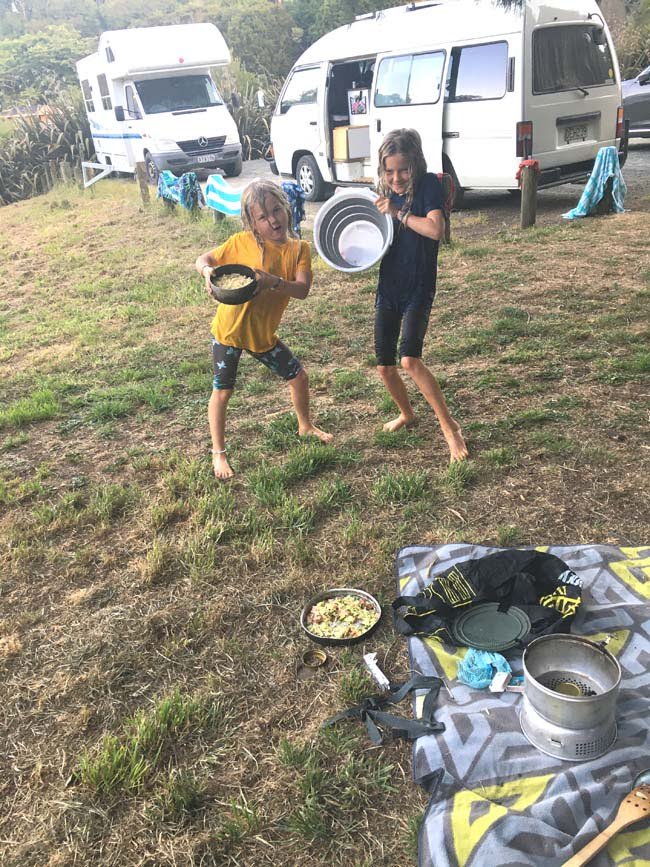
The girls carry the mixture to the river to rinse each piece individually. They have their own way of doing things and the pasta soon ends up on the rocks underneath. Wet through they fish each piece back up. ‘It was fun all the way down and up, right to the end,’ they say. I fry the onion and bacon and grate courgette and cheese into the mix – dinner is back on the menu. After dinner we decide to move the van. Now that most day trippers have gone we can turn around and shift the van along so the tailgate opens into the trees and we are next to the paddock. It isn’t easy but the two of them sort all the trajectories, gesticulating and springing from side to side until I am perfectly placed.
A wood pigeon sweeps low and heavy across to the stringy gums bending in the wind. Leaves flutter up from their graves in the carpark, and kahikateas drip long shadows into the late sun
On account of the macaroni abandoned on the grass and swept down the river, dinner is meagre and as the night in the van wears on the children become hungry. Fortunately I have half a dozen hardboiled eggs in the fridge.
Aria thinks that’s okay but she’ll only eat the yokes. Scarley can’t remember if it’s the yokes or the white she won’t eat. She reconsiders. ‘I’m really hungry. I think we should just eat the whole egg.’ They peel two each and gobble them down.
Bedtime follows a similar theme. We are sharing a double bed size space.
‘It’s too small,’ they declare. ‘We need queen sized-beds so we can do cartwheels and star jumps in our sleep.’ At least that’s what I hear.
Fortunately by ten they are fast asleep in their bags, snuggled close, and I am left wondering how it will go.
A new day. I get to sit out under a Kahikatea in my fold-out chair, hugging fresh coffee as the day wakes up around me. There is nothing quite like this moment.
I get to do as I please, and it always pleases me to wonder about it all again. It is never ending, endlessly satisfying, this wondering about it all. A slipping naked over the river stones to bathe in vastness. A pausing of the busy clutter of my ordinary life and the stories tugging me. I can sit alone and let my mind spread out into the grassy earth and sullen trees and cool blue sky, dissolving down and all around until my home is the numinous emptiness behind this endless fluxing. This is why I come away in the van, to do this, over and over. It feels important to keep remembering there is nothing at all to hold onto in any of my experience. It is all fleeting. It seems important to know I am this whole of life.
The girls are in the van making macrame bracelets out of embroidery cotton. They are playing patter ball on the table. They have taken up a drawing game. It will take time for the river to become warm enough for swimming.
They each have a high shelf for their books and games, clothes bags under the table, swimming gear separate. Shoes have a separate cupboard and toothbrushes are stacked together in a container above the front cab. Torches have their own shelf and like the cell phone plug directly into the solar power socket. All our raincoats and hats are folded together in another cubby hole. We all appreciate this high level of organisation, because three people living in a small van together is not that easy.
Down at the river where the sun has barely touched the water, the grass is still damp. Our pale skinny bodies test the temperature. Umber and ochre shadows wobble, both threatening and inviting us. The cool stillness is haunting. The long grasses and bush seem full of secrets, none of which we would understand, and when I go in first, because the girls are too scared and need me to so they can be brave, I remember the cold and how good it is to be submerged in this cool translucent glassiness slipping so easily around me.
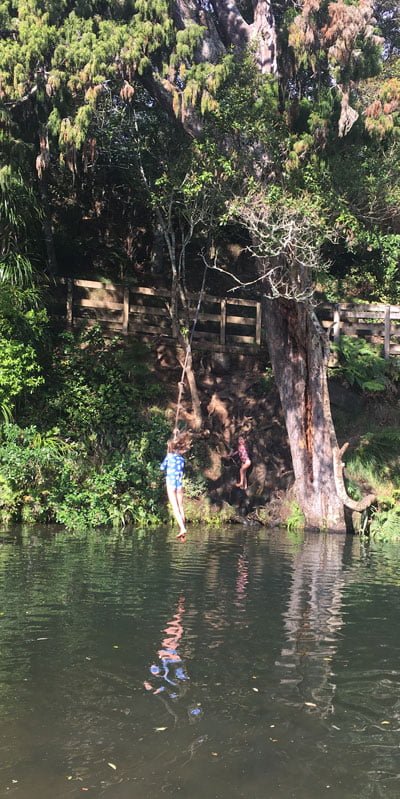 The girls tip-toe in until the agony is ridiculous, and they sink in a shriek and swim across to the rimu roots which are a webbed ladder, exposed and smoothed by the many clambering children. So many ways to soar out over the water acro-aquatic style, and plunge down into a bubbling vortex spilling them down into the silty bottom, over and over. Starfish, belly flop, pirouette, curled up, tandem. Every possibility attempted many times, no end to the play. By early afternoon the river scape has filled with families and food, barbecues and white bread. The New Zealand I knew as a child. Lots of Maori kids, ducking and splashing each other, a dog cajoled and then heaved down the bank, the smell of sizzling sausages. Girls in black teeshirts bob together in the water, giggling, about boys probably, tracing another pattern through the pelted, bomb-shocked water. It’s so hard to put your finger on what water is, the actual nature of it. I love the sensuous feel, but that’s all about me, my response. What about the water itself? What is its nature exactly? When I go into it in any depth I always end up perplexed. I’m a sailor. I’ve seen the many faces of the sea – its power, its beauty, its shimmering, bewitching courtship with the sun, the push and pull of its love for the land, its wobbling uncertainty in a gentle breeze. But none of these characteristics belong to the sea, nor the river. When I investigate closely, directly, without the shape of a thought, I find nothing at all.
The girls tip-toe in until the agony is ridiculous, and they sink in a shriek and swim across to the rimu roots which are a webbed ladder, exposed and smoothed by the many clambering children. So many ways to soar out over the water acro-aquatic style, and plunge down into a bubbling vortex spilling them down into the silty bottom, over and over. Starfish, belly flop, pirouette, curled up, tandem. Every possibility attempted many times, no end to the play. By early afternoon the river scape has filled with families and food, barbecues and white bread. The New Zealand I knew as a child. Lots of Maori kids, ducking and splashing each other, a dog cajoled and then heaved down the bank, the smell of sizzling sausages. Girls in black teeshirts bob together in the water, giggling, about boys probably, tracing another pattern through the pelted, bomb-shocked water. It’s so hard to put your finger on what water is, the actual nature of it. I love the sensuous feel, but that’s all about me, my response. What about the water itself? What is its nature exactly? When I go into it in any depth I always end up perplexed. I’m a sailor. I’ve seen the many faces of the sea – its power, its beauty, its shimmering, bewitching courtship with the sun, the push and pull of its love for the land, its wobbling uncertainty in a gentle breeze. But none of these characteristics belong to the sea, nor the river. When I investigate closely, directly, without the shape of a thought, I find nothing at all.
Yesterday we went up to the caves, a long dark underground chasm, just wide enough in places to squeeze through. The ceiling hung with wetas, the ground was slippery-wet underfoot and the walls were clammy. The space seemed heavy with an unnameable brooding. We started out tentatively, just visitors, but as the children played and finally dared to go through alone and then without a torch, and then in both directions, it all became very familiar and so they became bored and we left. I didn’t really know as I waited each time they reappeared from the bush giggling and racing around to the entrance again, full of their daring. I reached for snacks and water bottle and gazed into the nikaus and tree ferns wondering if they would save me from this lovely afternoon.
Soon we leave for Pirongia. The girls are determined we should climb it again. We went up last year, when they were six and seven years old. It took six and a half hours to get up and the next day, five and a half hours to get down. They each carried school bag packs and wore school shoes, sometimes on, sometimes off, and kept on going because there was nothing else they could do. After about four hours, our mission seemed hopeless, ridiculous, because we just kept on arriving at a bottom of a new ‘up’ when we were sure we had just climbed the penultimate one. ’You’ve got to be fucking joking,’ became our mantra for this situation. It really helped. We’re about to do it all over again.
We’ll drive to Corcoran Road end for the night, so we can set off early in the morning. With some excitement we pack our gear back into the van and clamber into the high front seats. The diesel engine rumbles reassuringly, wheels crunching on the gravel and we’re off, back on the open road. Everyone is smiling, right from deep inside. Lalita is both a home, and vehicle for exploring. She is a dream come true, at a cost. She is a gift and a liability. She is old, but today she is everything we could wish for. We travel slowly on these back roads, with the radio going and the air conditioning on. I pass around a water bottle.
My biggest fear has been tramping through a cloudless sky and overheating. It’s mid summer and the sun can be treacherous. Fortunately the next morning is overcast, drizzly, almost gloomy. There’s alway a strange car and strange people hanging about this carpark. I feel uneasy here, I did last year and last night. When morning arrives with the birds we are all still here in the van at the road’s end, I relax, like nothing happened which it didn’t.
The girls come close again, to be reassured I guess, and with packs on our backs and water bottles full we set out. We’re staying two nights at the hut this time. This year they are carrying some of the food as well as their clothes and sleeping bags. Each year they will be bigger and stronger and can carry more, which is good.
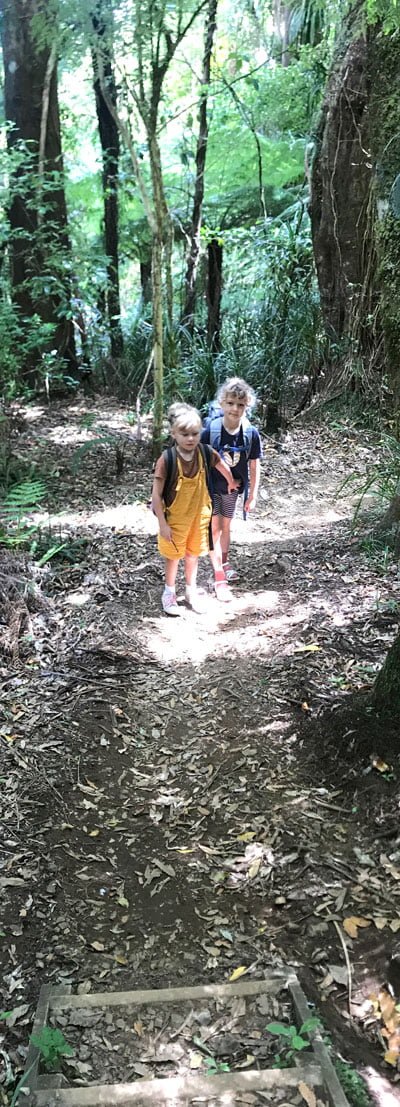 I know what happens in the first half hour. No matter how happy we are to be in the bush, breathing with the trees, brushing against the floating leaves, negotiating honest tree roots and rocks, we almost die. Our bodies are on ‘ordinary’ metabolism, and it takes time for the brain to get that we require much more effort. We need more glucose, more efficient ion transport, more oxygen and generally much more of everything. Slowly the brain switches us over, the situation improves and our legs lift us up and take us forward as they should. The girls stay in front and I stay far enough behind not to be annoyed by their endless chatter. We can’t see far, maybe ten metres in front because of the misty drizzle. We can’t see where we’re heading, no glimpses of spreading farmland, small settlements, the rest of the mountain, the ridges and valleys, the rocky outcrops. We can’t pause in a patch of sunlight – we’re in hooded raincoats most of the way. It’s strange the way the hours pass. It is very dreamy, this misty no-mans-land, with cotton wool slipping around the trees, opening out for a tiny glimpse of nothing much before closing in again. But for the orange markers we’d be totally lost. In single file we follow the markers, trusting that whoever put them there knew the way up the mountain. If only life were that simple.
I know what happens in the first half hour. No matter how happy we are to be in the bush, breathing with the trees, brushing against the floating leaves, negotiating honest tree roots and rocks, we almost die. Our bodies are on ‘ordinary’ metabolism, and it takes time for the brain to get that we require much more effort. We need more glucose, more efficient ion transport, more oxygen and generally much more of everything. Slowly the brain switches us over, the situation improves and our legs lift us up and take us forward as they should. The girls stay in front and I stay far enough behind not to be annoyed by their endless chatter. We can’t see far, maybe ten metres in front because of the misty drizzle. We can’t see where we’re heading, no glimpses of spreading farmland, small settlements, the rest of the mountain, the ridges and valleys, the rocky outcrops. We can’t pause in a patch of sunlight – we’re in hooded raincoats most of the way. It’s strange the way the hours pass. It is very dreamy, this misty no-mans-land, with cotton wool slipping around the trees, opening out for a tiny glimpse of nothing much before closing in again. But for the orange markers we’d be totally lost. In single file we follow the markers, trusting that whoever put them there knew the way up the mountain. If only life were that simple.
I had always thought that if I did my spiritual practice, and followed the teachings, went on retreats and was really sincere I would end up where the teachings pointed, at the moon. The teacher’s finger points to the moon. Don’t fixate on the finger, aim for the moon, the teachers implored. But what exactly is the moon? And does it make sense to suggest there is such a goal. Is it really that simple? And when does one grow out of all of this climbing a mountain stuff?
One of the way stations on our way up the mountain is a long overhanging bluff with a ledge where we shelter for lunch. It’s about the halfway mark and we are making good time. We crouch rather than sit, because the loose clay is damp. By request lunch is avocado, tinned tuna, sliced carrot and cheese-filled wraps, with Orere dried banana to finish. I hand out muesli bars for later on. I imagine us as early cave dwellers, and I imagine this would have a been a sought-after sanctuary in the rugged bush. It’s a hard climb all the way, no long stretches of easy walking. We’re mostly negotiating tree roots, a kind of clambering up and down and around the swampy parts. We finally arrive at the long stretches of board walks, where the peaty swamp would be impassable on foot. Now the children are off, way in front, tired legs instantly recovered, spirits refreshed. They are racing. We’re still an hour away, and it seems we should almost be there many times. The mist keeps hanging low, all the way to the hut.
I like having the hut to ourselves and I like company as well. The girls definitely like company. Otherwise it’s boring. They are in luck.
An older man is sitting alone by the corner window flicking through magazines. I hadn’t realise how much of an extrovert Scarley is, and how socially adept. I have a lot to learn from her. She immediately engages Pat in conversation, asking him about himself, then offering some detail about herself, light heartedly but persistently. He’s an ex- farmer and ex-prison officer who worked with the prisoners on farms. He’s come up from the Kaniwhaniwha campsite in training for the Te Araroa. I was surprised that he would have the strength, energy or enthusiasm at his age. He obviously enjoys the girls’ company although when they go over-excited and very noisy and skittish I’m not so sure. They do cartwheels and climb along all the railings and up the posts outside.
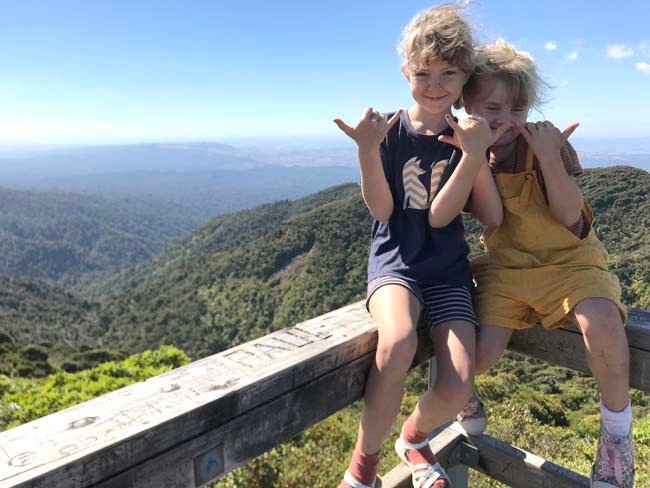
Outside is very good. Inside not so much. I can’t do much, because they definitely aren’t in the mood for being chastened, and too much shushing will make them burst out into something much worse. At least that’s been my experience. I just don’t know how unpleasant this is for Pat. They have just walked six hours up a mountain and now they are elated rather than tired, quite the opposite to me. I apologise for the noise and generally disorderly behaviour and he says that without them he would be very lonely and they are wonderful children.
Although they aren’t keen, we walk over to the cone in the drizzle the next day. This is what we had planned so this is what we will do. A whole day in the hut is not going to work. We haven’t brought any books or activities. There are six packs of cards to be flicked through and sorted and turned into building blocks. I’m surprised how many times I can play solitaire without winning.
They are at a curious age. Much of the time they are quite separate from me, and quite functionary with me, like I am a parent, to be tolerated because they need me. I might almost say they seem entitled.
Other times we are a cosy threesome, snuggling, sharing stories and being close, like the year before when they were younger.
The second night the hut fills with a team of young men in their twenties. Scarley studies them closely. They have no interest in any of us and certainly not her. This is going to be a boring evening. They sit around a table playing some game, completely ignoring us. She watches for a bit and then she starts asking simple questions. Their names. She wants to guess their birthdays, how old they are, the month they were born. She wants them to guess hers. In no time they are caught in her spell, and it lasts for hours. The hut fills with excitement.
I play the mother role. I provide a lighter for their gas burner, as they’ve forgotten to bring one, and I remind them their water is boiling dry when they are distracted. A few other people arrive before dark and the evening turns very convivial.
Next day we walk down. How I love these long walks. We have sunshine and rain, coats on and coats off. Our packs are lighter, and as always there is extra food we needn’t have brought. We have hours ahead of us, trudging over the mud and leaves and twigs and stones, carrying our packs. It’s exhilarating when I feel strong. I wonder what the girls like about it? The challenge? The bush? The simplicity? Using their bodies? Being part of a team? Doing what their bodies are built to do and take pleasure in?
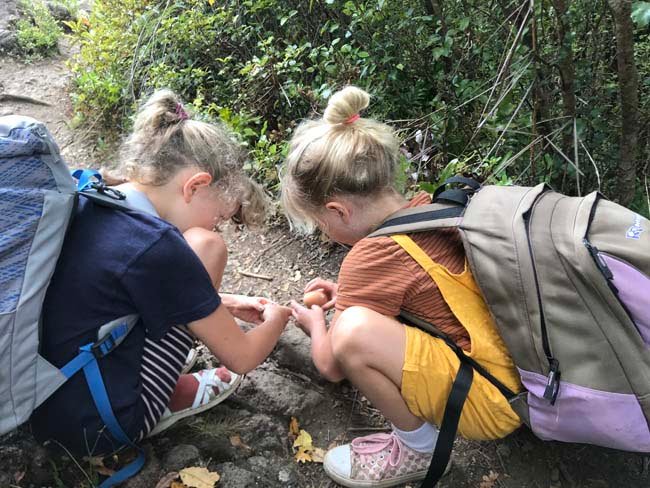
My body is made for walking miles a day with a load. It feels right. I mostly like that the ground never lets me go. It meets me every step of the way. I step down onto the ground, and then in some miraculous way this stepping force is returned to me to propel me forwards. Me and the earth are very close. I like the bush for the same reason. We exchange O2 and CO2, we co-evolved. Without plants I wouldn’t be here, and plants thrive on my CO2. I am enmeshed in very fundamental relationships.
We arrive back down to the car park safely. Lalita is where we left her. There’s always that moment before seeing, of not being sure. I don’t let worry out until the very last minute. Texts fly out all directions. We made it up and down the mountain. No one else has climbed the mountain (except Aria’s Dad) and we’ve done it twice! Laura, Aria’s Mum, my daughter, is keen to join us on the next leg of our adventure. I’m keen for her to come – I’d love some adult company and some help with these noisy high-spirited girls, who still leave everything tossed out of their bags before diving into a new upside-down antic in the back of the van.
We will head off pretty much straightaway for Pureora Forest Park and stop overnight on the way. Its just over a 100 km, a two hour drive for us, but I’m not keen to arrive late-and-tired with dinner still to be cooked. Laura will meet us tomorrow with four year old Asher and we’ll climb Pureora together.
– Dyana Wells, Raglan Whaingaroa, New Zealand Aotearoa


